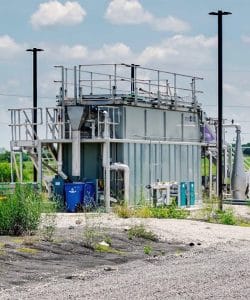Should You Consider Getting into the Wastewater Business?
Recently, Dunaway’s Senior Line of Business Manager, Eddy Daniel, PE spoke at the Texas Rural Water Conference. TRWA represents the full spectrum of the rural water community and is dedicated to helping water and wastewater systems provide efficient service and clean, safe drinking water to their customers. As a former Vice President of the Texas Rural Water Association, Eddy has designed, constructed, inspected, operated, and managed water systems for more than thirty-five years.
During his presentation at TRWA, Eddy discussed the benefits of getting into the wastewater business and what you can expect when your city or water utility decides to make the transition. See below for some of the biggest takeaways from his presentation.
 What are some reasons you should consider getting into the wastewater business?
What are some reasons you should consider getting into the wastewater business?
“High-Density developers often want to have the same retail water and sewer providers. Additionally, sewer service can diversify the utility and make it more difficult for other cities or utilities to attempt system encroachment.”
Are there different types of wastewater businesses?
“Yes, there are two different types of wastewater businesses – sewer collection and sewer treatment.”
What does it cost to implement?
“Typically, the entire cost of providing new retail sewer service is paid by the Developer. Developers have a budget for providing the sewer service, and if a developer district has or will be formed – they will be reimbursed for providing sewer service facilities. In terms of monthly costs, Utility providers will collect monthly bills for providing sewer service from the customers receiving service.”
What about billing?
“Most utility billing programs allow for the billing of multiple services. In some cases – instead of retail sewer collection or treatment, only sewer billing on behalf of another utility or city is provided.”
What about operations and maintenance?
“To operate a sewer utility, it will be necessary for cities or water utilities to hire a licensed wastewater operator. In terms of maintenance and equipment, developers will often provide the necessary “starter” equipment needed for utilities to start providing retail sewer service.”
Does wastewater affect other water customers?
“Sewer service is provided to a specific area or a subdivision, and sewer service is billed only to those customers who receive sewer service. Existing retail water customers would not pay for any part of the sewer service.”
Wastewater services are a vital component of the ongoing economic viability of smaller, rural communities and the quality of life of those who live in it. Performing water and wastewater studies to determine the required capacity and any expansion that may be necessary is crucial to the success of those entering the wastewater business.
”Who should individuals reach out to for assistance during this process?
“It is important to involve your consulting engineer and attorney when negotiating the details of a non-standard sewer service agreement or providing the design and construction of sewer facilities. It is also a good idea to talk to other water utilities who are currently providing retail sewer service for information.”
What are some project examples of cities and water utilities you have worked with that have recently gotten into the wastewater business?
“Copeville SUD, based in Collin County, has recently gotten into the wastewater business. Located in eastern Collin County in the vicinity of Copeville, Texas along State Highway 78, just eight miles southwest of Farmersville, the Copeville Special Utility District provides retail water service to a large rural area. Copeville SUD purchases treated surface water from North Texas Municipal Water District (NTMWD). Another example is the Wylie Northeast Special Utility District, located in Collin County – north of the City of Wylie. The Wylie NE SUD is the retail service provider for sewer and water within the Inspiration subdivision and surrounding areas. The sewer is transported to the City of Wylie’s regional wastewater treatment plant for treatment.”
Wastewater services are a vital component of the ongoing economic viability of smaller, rural communities and the quality of life of those who live in it. Performing water and wastewater studies to determine the required capacity and any expansion that may be necessary is crucial to the success of those entering the wastewater business. As trusted advisors, Dunaway’s team of specialists can complete these studies while also educating growing cities and water utilities as they evolve.
When the growth in your city or water utility is happening faster than you can effectively manage – reach out to Dunaway to help make your transition into the wastewater business a simple one.
